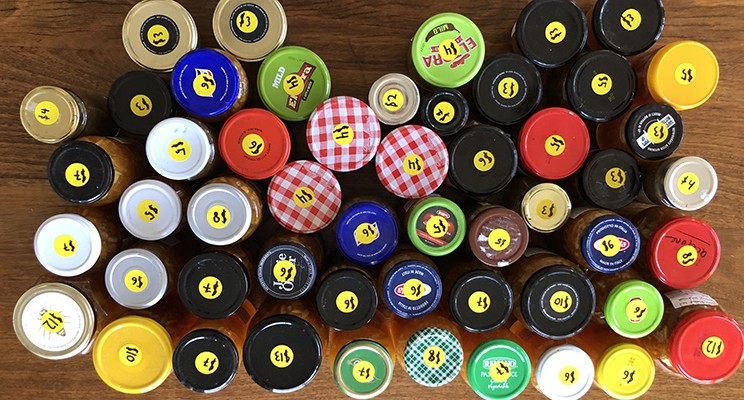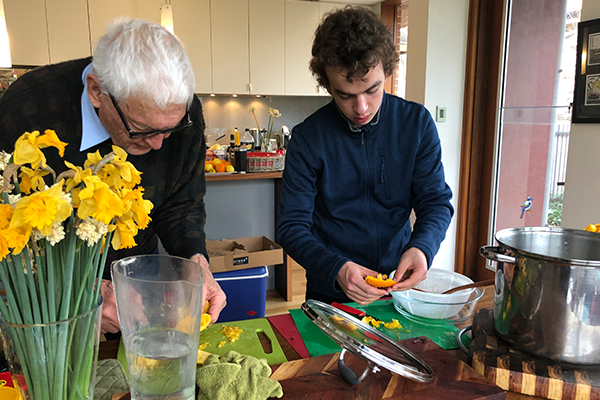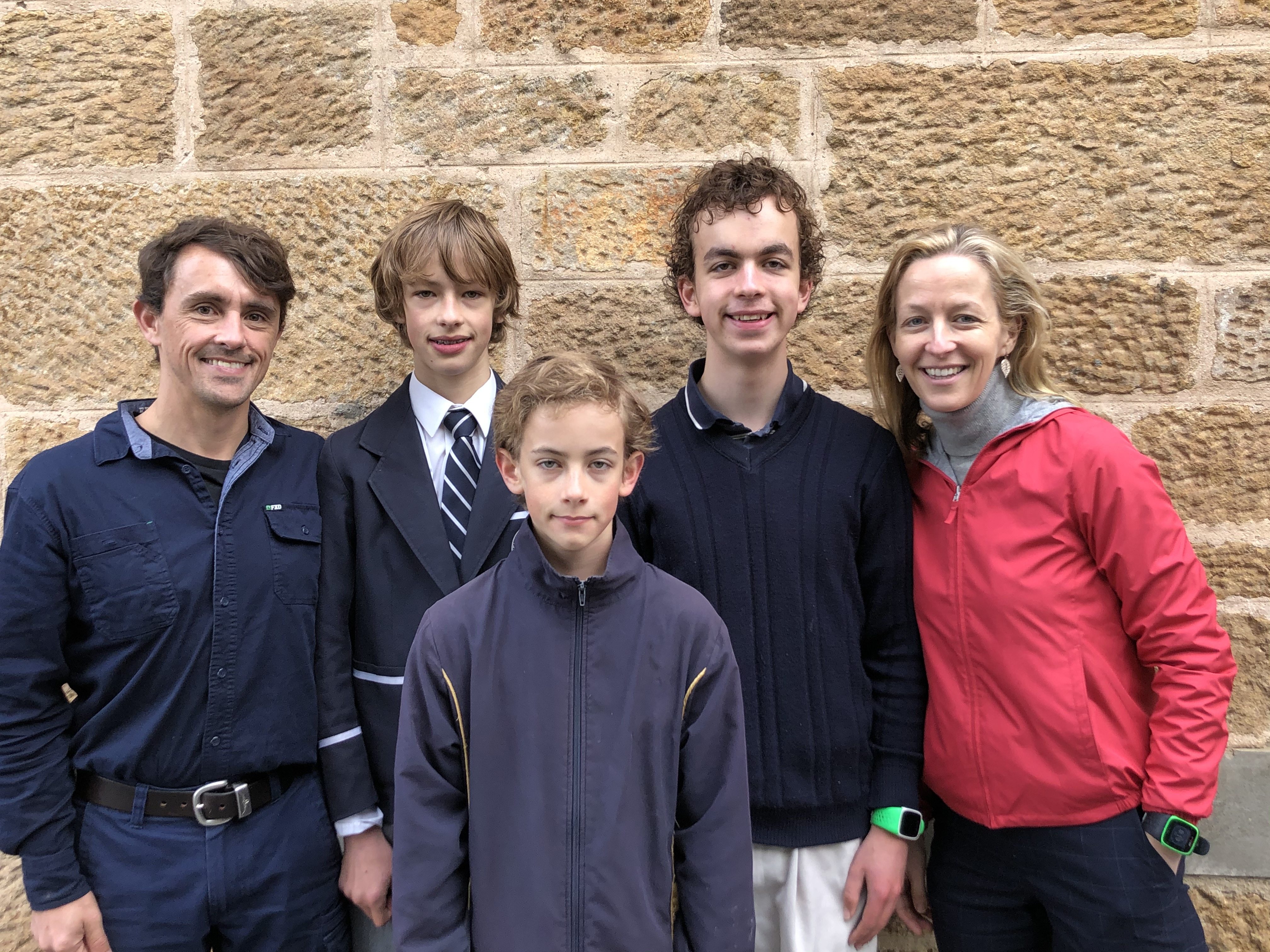Marmalade for Microfinance
From small jars of preserves, big change can occur. Chief Philanthropy Officer, Veronika Peters, sat down with Kirsty Munro to talk parenting, philanthropy, and how to balance both.
Over the years I have discussed philanthropy with people from all different backgrounds and each story inspires me in my own journey. As a parent I am intrigued on the role philanthropy plays as a value and virtue that is passed on from one generation to the next. How do busy families committed to a lot of different activities foster a culture where giving becomes a family priority? Kirsty Munro, her husband Anthony and their three children live in South Australia and have been very active Opportunity supporters for almost 20 years.

Lachlan Munro has begun raising funds for Opportunity by making and selling Marmalade. All images courtesy of the Munro family
Veronika: What or who first inspired you in your giving?
Kirsty: When we were little we were given pocket money and the expectation from my parents was that we would give from that to the church collection plate. We might have been given 50c, from which we gave 10c to church, and it might not sound like much, but to me that was ten lollies I was not eating! My family always gave to church, charities and the arts, and this was normal behaviour, but it was done without many people knowing about it.
As I grew up to be an adult, I wasn’t particularly consistent in my giving but fresh after coming out of university—still with a student mindset—I was surprised how much money graduates earned, even in a humble government job! I didn’t feel I needed to change much from my student days and knew I didn’t need a lot financially to be happy.
V: How did you meet Anthony and what role does giving play in your marriage and family?
K: I met Anthony while I was at university. He was really smart and good looking, and fun and relaxed. We got married when I graduated. I asked friends and family if they had a charity they supported, and why it was important to them. My uncle recommended Opportunity. Initially, I started giving a small amount to Opportunity and another charity, and fairly quickly the amounts increased as we felt we could afford to give more. I liked what Opportunity stood for. I was so aware of the opportunities I had received in my life—there was nothing to distinguish me from a young woman born in a country overseas, and I was conscious of the lottery of birth country. By sharing the benefits in the world, we are making a positive impact—simply because we can. It doesn’t hurt us to not eat out every week or to go without some of the luxuries—every time we do, it helps someone overseas.
V: What is the key in this?
K: It's just money, it's not an idol. Recently, one of my father's friends was passing away and they were talking of money. My father made light of a comment relating to giving, saying that if you are used to giving away ten per cent, you never miss it, because you have not even seen it. I’ve heard others say to ‘give till it hurts’, as in, give to an extent that you can feel the difference because it will always help others abroad so much more than it will impact you. I guess it’s another way to loosen the hold of money on any of us, and to remember there are always others living on less, and in our lives, there is always enough. We have been given so much in our lives, we know it's a blessing. We can help others.

Longtime Opportunity supporter, Ian Fotheringham, teaches Lachlan Munro the art of marmalade making.
V: What are some of the ways you have raised funds for Opportunity over the years?
K: Besides the gifts we give, we encourage others to give as well. Last year, my oldest son Lachlan has made a bunch of marmalades he is selling for charity—helped by another Opportunity supporter in Adelaide who taught him the art of jam making. They’re working on their marketing strategy, but something like ‘Man-made Marmalade’ or ‘Marmalade for Microfinance’.
Over the years, we have hosted many dinners in our home to raise awareness and funds for Opportunity. We hosted Malaysian ‘Noodle Nights’ catered for by the remarkable and entertaining (late) Susan Lee, we hosted curry nights in our home, initially catered for by us and some friends, and more recently, with the generous donation of curries from five Indian restaurants in Adelaide who sponsored the events.
We have hosted ‘pick your own mulberries’ from the huge trees in our garden in springtime and have rented out the spare room upstairs on Airbnb—advertising on the site that all money would go to Opportunity.
I kind of like that the small things we do at this end—often little microfinance ventures themselves—make a big difference to entrepreneurs overseas setting up their own small businesses.
One of our favourite events (which we can’t do this year) is renting out car parking spots on our property for the Adelaide Show. Our kids would dress up in fun costumes to attract cars into our driveway, with all funds raised going to Opportunity. People were going to be paying $20 for car parking wherever they parked, but through people parking in our driveway, we were able to raise more than $2,000 during the Show. People were interested to hear the money was donated to charity and wanted to hear a little about the organisation we were supporting. It feels great to be able to do that.
V: You work full time, you are a busy mother of three boys, how do you find the time to raise funds for Opportunity?
K: Hah, none of us has enough time, do we? Everyone makes time for what they love. I do what I do because it is fun, and it is what I believe in. Where your heart is, that is what you prioritise. Life is about more than just mortgages. It was my oldest son who said to me one day when he was in lower primary school, “We don’t give enough money to poor people". He couldn’t see what we had been doing, but that’s when I decided to become an Opportunity Ambassador in South Australia, so we could be more vocal about giving not only of money but also of our time and our efforts, and to be doing so together with others. I like the conversations we have when the boys come in from selling the car parking, bored that it takes so long to earn money, or that they have spent lots of time with no one buying. We talk about what it might be like for a child to be bored of being hungry overseas or bored of not being able to afford to go to school. It helps keep things in perspective, and it helps to remember the world is bigger than the suburb we live our life in.
V: Can you describe the role you have played as an Ambassador over the years and what this has meant for you?
As an Ambassador, I shine light on Opportunity. I gather people to give together to support Opportunity; I speak up for Opportunity and the people Opportunity serves. It's comes naturally to me, but I do it because it’s fun. I’ve enjoyed speaking at events about Opportunity and I’ve enjoyed the difference in the role from my everyday work.

The Munro family has been supporting Opportunity for nearly two decades, while managing family and career commitments.
V: Why did you choose to partner with Opportunity?
K: It’s one thing to start supporting, it’s another thing to commit. The recipients of microfinance loans through Opportunity are overwhelmingly women, most of them in the age brackets I have been in while I’ve been supporting Opportunity. These are women who are working to improve the lives of their family, and their children. Together, they enhance the social capital of their communities, they support each other, they strive to give their children a better life. They are busy, working mothers. I identify with them, and wonder how different my life would have been, had I been born to a different family in a different part of the world. I like that ‘from little things, big things grow’; I like that this gives women a sense of agency in their lives, and for many of them, the first time they have had financial independence even on a small scale. We know that when women have financial control in their families, the money is spent on the children and on the family, more so than on themselves.
I like what Opportunity stands for, what it does to help these women individually, and what it does to improve the communities they live in: through educating women about family and domestic violence, through helping with community health initiatives, through supporting the creation of toilets nearer the family home so young women are less at risk when they need to go to the toilet at night. I like the Gifts of Opportunity initiatives too— gifts that give more to others.
V: You’ve spoken about your passion for helping women start their business, while your husband has shared about our EduFinance program before. What about these programs appeals to you?
K: As Opportunity has grown as a microfinance non-profit, its focus has broadened beyond individual microfinance loans to expand to other areas of a community: schooling, healthcare, and other aspects that improve people’s lives. EduFinance is about recognising that where quality schooling can be made accessible, the whole community benefits, and the longer-term impacts for communities are both lasting and cost-effective.
V: If you could be a voice for the women we represent overseas, what would you say?
K: When you throw a pebble in a pond, the concentric circles ripple outwards. Where do you want your impact, your legacy to be? Do you define yourself in your suburb, your town, your state, your country? And while you think of that, when you think of helping others, who is your neighbour? For me, the circle is wider. While COVID-19 means we can’t travel to the lands we love, we can still do our bit to help this world. Give what you can, when you can, because whatever you give has a benefit abroad many times greater than the same amount spent here.
V: Finally, what are your hopes and dreams for the world you would like your kids to grow up in?
It’s rose-coloured glasses territory, I know, but I’d like my boys to grow up seeing the good in the world, and putting themselves firmly in the centre of doing good in the world.
K: To me, that includes compassion and kindness, generosity and humility, empathy and awareness. I want them to strive to do well in their own lives, so they can positively impact the lives of others. Bringing the individual stories of the hopes and dreams of opportunity supporters to light shows how universal our aspirations are for our families and our loved ones, and by extension, for the communities we each live in. And so, anything we can do individually, to reduce family and domestic violence, to enhance the quality of schooling, to improve the quality of healthcare and understanding of basic sanitation, will save lives. But in its essence, it’s treating the world by the ‘campsite rule’—we should leave the world better than we found it.
Find out more about how you can become an Opportunity Ambassador, or send our team an email at ambassadors@opportunity.org.au to discuss the kind of ambassador role that would suit you.